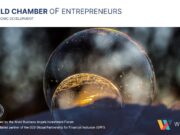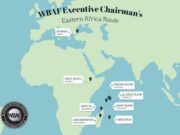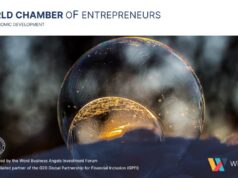Bahrain’s universities are on their way to including WBAF’s Angel Investor 101 course as an obligatory module for undergraduate students in business administration. The Secretary General of the Higher Education Council of the Kingdom of Bahrain and WBAF’s Executive Chairman met with the rectors, deans, and executives of 14 universities to discuss how undergraduate students in Bahrain universities can benefit from WBAF’s Angel Investor 101 course module and the WBAF Financial Inclusion Center. The outputs of the meeting were very promising for Bahrain’s startup economy:
- Universities in Bahrain will have full access to WBAF’s academic curricula on angel investment, including coursebooks, workbooks, trainer guidelines, case studies, quizzes, and exams.
- All students and faculty members at Bahrain’s universities will have an opportunity to benefit from the WBAF Financial Inclusion Center for global networking, quality mentorship, and smart finance.
- Engagement of Bahrain universities with WBAF will open the way for U-BANs (University Business Angel Networks) in each university, which will ease access to finance for startups in entrepreneurship clubs and centers and close the finance gap for commercialising faculty members’ research projects.
- Entrepreneurship centers and clubs at universities in Bahrain will become official partners in World Business Angel Investors Week 2023, which is coordinated globally by WBAF and celebrated every year in 132 countries.
- Faculty members at universities in Bahrain will have an opportunity to use the WBAF Financial Inclusion Center to deliver global educational courses on entrepreneurship, innovation, digital economies, and business transformation.
- WBAF will also support incubation programmes running at universities in the Kingdom of Bahrain.
(BAHRAIN) Entrepreneurship education has come a long way in the past two decades. The mindset of students of entrepreneurship has also changed and will surely continue to evolve. More and more business organizations are adopting an entrepreneurial spirit. Even conservative firms are making it their mission to augment their entrepreneurial energies and promote a culture of creativity and innovation. With this in mind, we need to revisit our current business curricula and adapt them to meet the needs of the current and future entrepreneurial ecosystems.
Angel investors have begun taking a key role in financing young entrepreneurs and startup ventures. In 2021 alone, 320,000 angel investors invested 9.6 billion EUR in startup ventures, and in the United States and Canada, 340,000 angel investors invested 26 billion USD in startups. Angel investors are different from other investors: they provide more than just money to young entrepreneurs and startup businesses. They also provide smart finance (a bundle of money), mentorship, networking, and know-how.
Surveys reveal that entrepreneurs are able to create more success stories if they receive investment from qualified angel investors. Educating angel investors has therefore become a worldwide trend that aims to enhance their contribution to the startups they invest in.

WBAF is the only institution in the world that delivers a special training course for potential angel investors: the QBAC+ Qualified Angel Investor Certification Course with a Proficiency Test.
Financial roadmap of entrepreneurs
Consider the various sources of finance available to young entrepreneurs: Beyond basic bootstrapping, there are corporate ventures, angel investors, crowdfunding platforms, accelerators, VCs, banks, public grants, co-investment funds, business plan competitions, technology transfer offices, family offices, private equity investors, and stock exchanges. With the notable exception of angel investors, all these sources provide only money, nothing more.
The only true sources of smart finance are angel investors, who are able to influence a country’s economic development by providing more than just money to entrepreneurs and SMEs. They contribute their own know- how, provide mentorship, and share their networks with the businesses they invest in. They are thus the main drivers of innovation and the natural leaders of the world’s early-stage investment markets.

Angel Investment 101 for undergraduate students
The World Business Angels Investment Forum invites higher education institutions to consider including Angel Investment 101 – a brand new course module – in their academic programmes so that young entrepreneurs and founders of startup ventures graduate having learnt the mindset of investors and executives of funds. What are they looking for? What are their investment strategies? What are they learning before making an investment? How do they prepare term sheets? How do they negotiate with entrepreneurs in closing deals? What are they looking for in due diligence reports? Why is it more difficult to raise 1M than 5M?
The objective of the course is to introduce the investor mindset and strategies to university students who are considering raising funds from corporate ventures, angel investors, crowdfunding platforms, VCs, banks, public grants, co-investment funds, business plan competitions, family offices, and private equity investors. The course aims to teach the basic principles of investing and the do’s and don’ts of raising funds as a qualified entrepreneur or startup founder.



























